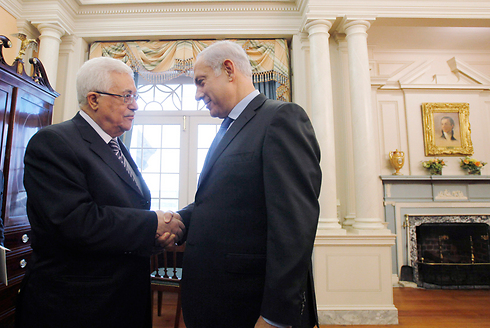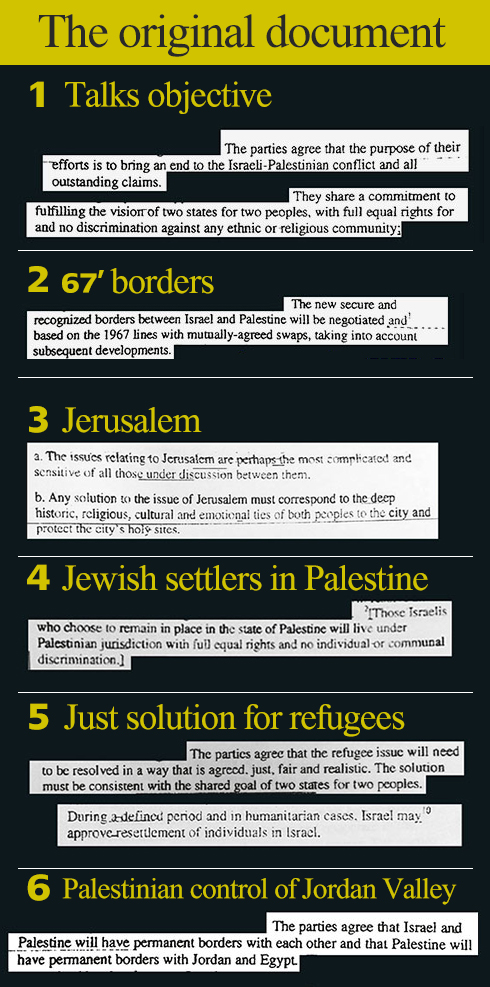During his second term as prime minister, Benjamin Netanyahu sent a close affiliate to negotiate with the Palestinians and offered what appeared to be drastic concessions to the Palestinian leadership on a number of core issues, including land swaps, a potential deal regarding Jerusalem and even a limited right of return for Palestinians.
The concession list was revealed in a document from August 2013 and attained by Ynet's print publication Yedioth Aharonoth summarizing the results of the secret talks between Netanyahu's senior aide, lawyer Yitzhak Molcho, and Palestinian President Mahmoud Abbas' affiliate, Hussein Agha.
Agha, an Oxford professor who was born in Lebanon joined the Palestinian Liberation Organization as a youth and is considered one of Abbas' closes affiliates, while Molcho went on to serve as Israel's leading peace negotiator alongside Tzipi Livni during the last bout of US-brokered peace talks.
The document, penned after the talks took place during Netanyahu's second government (2009-2013), gives a rare view of the possible concessions Netanyahu was willing to make to reach a peace deal with the Palestinians and seems to stand in stark contradiction of his hawkish views.
The document is titled "Draft Proposal for Statement of Principles Towards a Permanent Arrangement" and is revealed in full in Yedioth Aharonoth's weekend supplement.
Concession list: 67' borders, Jerusalem and refugees
The document offers what seems to be an opening for an Israeli return to the 1967 'Green-Line' borders – a longstanding Palestinian demands Netanyahu has rejected as a precondition for a peace deal on numerous occasions – on the basis of a mile-for-mile exchange ratio.
"… (T)here will be a full Israeli withdrawal implemented gradually of Israeli forces from Palestine's territory. The last of the Israeli forces will withdraw with the implementation of the agreement's final stage," the document recorded.
In other words, the document revealed Netanyahu was not only willing to trade land with the Palestinians, but was willing to offer them full restitution for lands seized by Israel during the 1967 Six Day War, implicitly accepting the Palestinian claim on the entirety of the West Bank as land for a future Palestinian state.
"The sides are in agreement that Palestine will be an independent, sovereign and viable state whose size will be in relation to the areas which were under Jordan and Egypt's control before June 4th 1967 (the eve of the Six Day War) (…) the agreement establishing the formation of Palestine will permanently resolve all claims, including the issue of settlements," the document read.
As part of the proposed land swap, the document laid out the framework for uprooting a a large number of West Bank settlements and even stipulated leaving some settlers in the West Bank under Palestinian Authority control.
"Israelis who will choose to remain in the Palestinian state will live under Palestinian jurisprudence," the document said.
Regarding Jerusalem, which the Palestinians want as their capital and has been a nonnegotiable point for Israel, the document's wording was more careful, but not devoid of significance, offering an implicit recognition of the Palestinians' claim on East Jerusalem.
Furthermore, the document said the Palestinians were offered a permanent foothold in the Jordan Valley, an area which Israel was reluctant to concede control over during the previous round of peace talks. The last round of peace negotiations almost fell apart as a result after a lawmaker from Netanyahu's Likud party spearheaded a bill that would annex the territory to Israel, effectively taking it off the negotiations table.
The document also reveals surprising Israeli leeway regarding the much-debated Palestinian right of return for those displaced on the eve of Israel's formation in 1948. The document revealed Israel offered Palestinian 'refugees' the right of return on a personal – as opposed to national – basis.
The article relating to Jerusalem was vaguely worded and appended with a warning: "Any solution must address the historical, social, cultural and effectual ties of both peoples to the city and offer protection to the holy sites."
In response to the report, Netanyahu's office said: "At no point did Prime Minister Benjamin Netanyahu agree to withdraw to 1967-lines, divide Jerusalem or recognize the Palestinian right of return. That was and remains his position."
His office rejected the document as proof of an Israeli concession, saying it was an American proposal that Israel never signed-off on.
"Molcho's talks were brokered by the Americans and failed to yield any agreements. (The talks) focused on an attempt to create an American proposal to moving negotiations forward with each side maintaining the right to express reservations from any of the articles which they deem unacceptable."


















